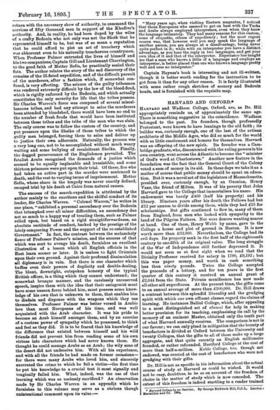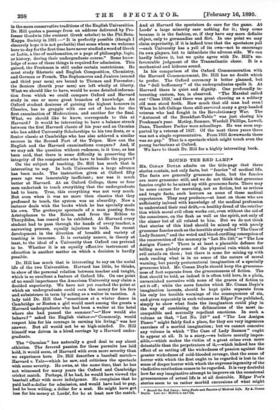HARVARD AND OXFORD.*
HARVARD and Wadham College, Oxford, are, as Dr. Hill appropriately reminds us, of approximately the same age. There is something suggestive in the coincidence. Wadham belonged to the past. Its founders, though professedly Protestant, were known to have leanings to the old faith ; its builder was, curiously enough, one of the last of the artisan architects of the Middle Ages, who did so much for the world with so little emolument and honour for themselves. Harvard was an offspring of the new spirit. Its founder was a Cam- bridge graduate, who, discontented with the ruling powers in his own country, went across the Atlantic to become the " minister of God's word at Charlestown." Another new feature in the foundation was the fact that the General Court of the Colony voted a sum of money in its aid. In these days we take it as a matter of course that public money should be spent on educa- tion. But it was a novel act of the legislators of Massachusetts, presided over, curiously enough, by an Oxonian, Henry Vane, the friend of Milton. It was of his poverty that John Harvard gave to the College that immortalises his name. His endowment was barely 2400 (half his property) and his library. Nineteen years after his death the Fellows had but 212 per annum to divide among them, while they had 215 for scholarships. But gifts continued to flow in, many of them from England, from men who looked with sympathy to the land of the Pilgrim Fathers. Nor were donors wanting nearer at hand. One of them, Henry Webb by name, gave to the College a house and plot of ground in Boston. It is now worth more than 233,000. Nevertheless, the College had its evil days. Its property sank in the first half of the eighteenth century to one-fifth of its original value. The long struggle of the War of Independence still further depressed it. It would not seem so at first sight when we read that the Divinity Professor received for salary in 1780, £9,192; but this was paper money, and worth in cash something less than ninety pounds. Twice the College accepted the proceeds of a lottery, and for ten years in the first quarter of this century it received an annual grant of 22,044 from the State. Private munificence has now made all other aid superfluous. At the present time, the gifts come to an annual average of more than 2100,000. Dr. Hill draws a contrast between this splendid liberality and the grudging spirit with which our own affluent classes regard the claims of learning. He instances Balliol College, which, after appealing to a most distinguished set of alumni for help in making better provision for its teaching, emphasising its call by the memory of an eminent Master, obtained only the tenth part of what Harvard annually receives. The comparison is not in our favour; we can only plead in mitigation that the bounty of benefactors is divided at Oxford between the University and twenty Colleges, that the gifts to all of these make up a large aggregate, and that quite recently an English millionaire founded, or rather refounded, Hertford College at the cost of more than half-a-million. Keble College, too, though not endowed, was erected at the cost of benefactors who were not grudging with their gifts.
Dr. Hill is not as specific in his information about the actual course of study at Harvard as could be wished. It would not be easy, doubtless, to be so on account of the freedom of choice in the matter of study which is now conceded. The extent of this freedom is indeed startling to a reader trained • Harvard Collwge by an Nankin. By George Birkbeck Hill, D.C.L. London Macmillan and Co. 18914
in the more conservative traditions of the English Universities. Dr. Hill quotes a passage from an address delivered by Pro- fessor Goodwin (the eminent Greek scholar) to the Phi-Beta- Kappa Society in 1891:—" It is perfectly possible (though I sincerely hope it is not probable) that some whom we welcome here to-day for the first time have never studied a word of Greek or Latin, a line of mathematics, or a page of philosophy, logic, or history, during their undergraduate course." Some know- ledge of some of these things is required for admission. This gained, the Freshman is still under certain restrictions. He must study Rhetoric and English Composition, Chemistry, and German or French. The Sophomores and Juniors (second
and third year men). are bound to Themes and Forensics ; the Seniors (fourth year men) are left wholly at liberty.
What we should like to have, would be some detailed informa- tion from which we could compare Oxford and Harvard study in one or more great branches of knowledge. An Oxford student desirous of gaining the highest honours in Classics, has to grapple with one set of books for the first examination of Moderations, and another for the final. What, we should like to know, corresponds to this at Harvard ? It would be interesting to have a balance struck between the first Harvard classic of his year and an Oxonian who has added University Scholarships to his two firsts, or a Senior classic at Cambridge who has also achieved a similar success in the Second Part of the Tripos. How can the English and the Harvard examinations compare ? And, if we may ask the question without rudeness, is it true, as has been said, that there is some difficulty in preserving the integrity of the compositors who have to handle the papers ?
On the subject of teaching, Dr. Hill has much that is interesting to say. In both Universities a large advance has been made. The instruction given at Oxford fifty years ago was lamentably inefficient ; nor was it much better at Harvard. At an Oxford College, three or four men undertook to teach everything that the undergraduate had to learn. True, this everything was not very much. But even when it was no more than classics that they professed to teach, the system was an absurdity. Now a lecturer deals with the books which he has specially made his own. The grotesque spectacle of a man passing from Avistophanes to the Ethics, and from the Ethics to Thucydides, has ceased to be exhibited. At Harvard every student had to pass through the hands of every teacher, a narrowing process, equally injurious to both. Its recent development in the direction of breadth and variety of teaching is immense. It is certainly nearer, in theory at least, to the ideal of a University than Oxford can pretend to be. Whether it is an equally effective instrument of education is another matter on which a decision is hardly possible.
Dr. Hill has much that is interesting to say on the social life of the two Universities. Harvard has little, he thinks, to show of the personal relation between teacher and taught, which is so excellent a feature of Oxford life. On one point of no small importance the American University may claim a decided superiority. We have not yet reached the point at which an undergraduate could earn the money for his fees and subsistence in term by acting as a waiter in vacation. A lady told Dr. Hill that "sometimes at a winter dance in Cambridge or Boston a girl would meet among the guests a Harvard undergraduate who had been a waiter at the hotel where she had passed the summer."—" How would she behave ? " asked the English visitor.—" Commonly, would respect him for his courage in earning his living," was her answer. But all would not be so high-minded. Dr. Hill himself was driven in a hired carriage by a Harvard under- graduate.
The "Oxonian" has naturally a good deal to say about athletics. The fevered passion for these pursuits has laid hold, it would seem, of Harvard with even more severity than we experience here. Dr. Hill describes a baseball match— Harvard v. Yale—which he saw, and criticises the spectacle with some severity. He owns, at the same time, that he has not witnessed for many years the Oxford and Cambridge cricket match. Perhaps, if he had, he would have viewed the baseball affair with more indulgence. He complains that he paid half-a-dollar for admission, and would have had to pay, had he been willing, a dollar for a seat. He might have got less for hie money at Lords', for he at least saw the match.
And at Harvard the spectators do care for the game. At Lords' a large minority care nothing for it; they come because it is the fashion, or, if they have any more definite object, only to gormandise and flirt. In one point we may claim superiority, if it is indeed true that the spectators yell —each University has a yell of its own—not to encourage its own players, but to intimidate the adverse side. We can hardly believe it, but we quite agree with Dr. Hill's un- favourable judgment of the Transatlantic cheer. It is a mechanical and hideous sound.
In his comparison of the Oxford Commemoration with the Harvard Commencement, Dr. Hill has no doubt which to prefer. The Oxford ceremony is better planned, but the "dull buffoonery" of the undergraduates spoils it. At Harvard there is quiet and dignity. One profoundly in- teresting custom, too, is observed. "The Marshal called out Class 1826,' and there was great cheering as a solitary old man stood forth. How much that old man had seen! When he left College there still survived many a grey-headed veteran who had fought in the Revolutionary War. The "Autocrat of the Breakfast-Table" was just closing his Freshman's year. Motley, Sumner, Wardell Phillips, Lowell, Dana, Theodore Parker were schoolboys. He was soon sup- ported by a veteran of 1827. Of the next three years there was not a single representative. From 1831 downwards there was no gap." That is a spectacle which might touch even the young barbarians at Oxford.
We have to thank Dr. Hill for a highly interesting book.



































 Previous page
Previous page